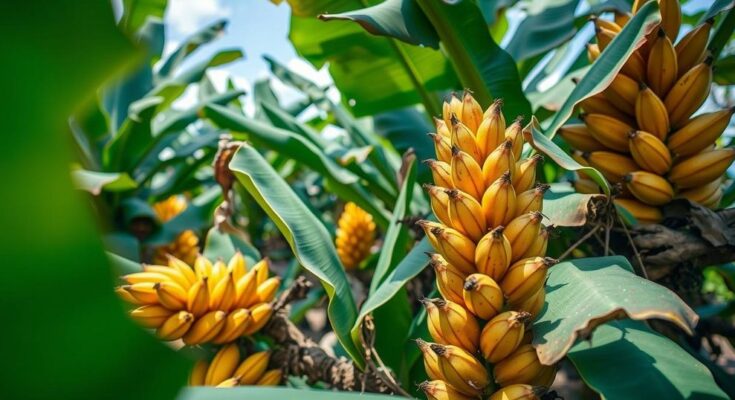A novel insurance initiative led by the NDC Action Project is providing banana farmers in Uganda with increased resilience against extreme weather, which has become more frequent due to climate change. With hands-on training and a digital platform for damage reporting, this project aims to protect farmers’ livelihoods while promoting sustainable agricultural practices.
In October, Ahumwire Justine, a banana farmer from Shuku in southwestern Uganda, faced a harrowing experience when a severe rain and hailstorm obliterated 300 banana trees and resulted in the death of two of her cows. The devastation left her family contemplating abandoning their two-hectare farm, which was without insurance. “We had no food, no money for school fees for my children and no food for my animals,” lamented Justine, a mother of four. The increasing frequency and severity of extreme weather events, largely attributed to climate change as reported by the Intergovernmental Panel on Climate Change, have made farming conditions perilous in Uganda. To combat these challenges, the NDC Action Project—a collaborative effort between the United Nations Environment Programme (UNEP) and the UNEP Copenhagen Climate Centre (UNEP-CCC)—is working to provide farmers like Justine with vital insurance coverage against such climate-induced disasters. Mirey Atallah, Chief of the Adaptation and Resilience Branch within UNEP’s Climate Change Division, emphasized the significance of this initiative in aiding smallholder farmers to adapt to the climate crisis: “We know farmers, particularly smallholders, are struggling to adapt to the effects of the climate crisis. That’s why projects that combine technical and financial instruments such as these are so important. They increase resilience and ensure that extreme weather does not have to be catastrophic for farmers.” Notably, bananas play a critical role in Uganda’s economy, with approximately 47 percent of farmers engaged in their cultivation as of 2019, according to the nation’s statistics bureau. Beyond being a staple food, banana plants provide fibers for various uses, including ropes and mats, and leaves that serve purposes such as mulching and packaging. However, farmers face an uncertain outlook as climate change continues to disrupt weather patterns, leading to erratic growing seasons characterized by both drought and excessive rainfall. Florence Muranga, Director of the Banana Industrial Research and Development Centre, noted, “We could have two years of non-stop rain, and then six months with no rain at all. [Farmers] can lose their food, their livelihood, their house in one day.” The Banana Industrial Research and Development Centre, which represents 5,000 banana farmers, is instrumental in expanding access to crop insurance. They have initiated training to equip 930 farmers with smartphone skills to upload images of their healthy crops onto a digital platform. In the event of severe weather, farmers can report the damage through this system, allowing agroeconomists from the insurance company to assess and quantify the losses. Notably, nearly fifty percent of the farmers participating in this trial are women. With many farmers previously lacking smartphone experience, the Centre has designated ‘Champion Farmers’ like Justine to assist others in mastering the technology. Collaborating with Agriculture and Climate Risk Enterprise Africa, this initiative connects smallholder farmers with insurance providers through Agro Consortium Limited, which encompasses a network of 13 insurance firms. This digital approach minimizes the need for in-person claims assessments, facilitating quicker payouts and reducing premiums for farmers. In addition to insurance, the program includes training in water management and agroforestry, which has significantly increased productivity and reduced climate-related losses. By lowering the payout risks for insurance companies, this approach also enhances farmers’ ability to secure loans from financial institutions. Following the success of this pilot project, plans are underway to extend this insurance initiative to all 5,000 farmers under the Banana Industrial Research and Development Centre, with an eventual goal of serving 50,000 banana farmers countrywide. For Justine, this insurance provides a profound sense of security: “I know that if [my crops get damaged] I have help. It’s not like in other years, where I would have to start from zero.” To address the wider climate crisis, UNEP is actively supporting the objectives of the Paris Agreement, aiming to limit global temperature rise and has devised a Sectoral Solution strategy. This comprehensive roadmap seeks to lower emissions across key sectors, including agriculture and food, which are integral to achieving climate stability.
Banana farming is vital to Uganda’s economy, with a significant portion of the population engaged in its cultivation, not just for sustenance but also for various ancillary uses. However, increased climate volatility poses a substantial risk to farmers, underscoring the need for innovative solutions such as crop insurance. The NDC Action Project symbolizes a crucial step in providing farmers with the financial resilience necessary to withstand extreme weather events, contributing to sustainable agricultural practices within the context of a changing climate.
In conclusion, the introduction of a novel insurance model for banana farmers in Uganda stands as a testament to proactive responses to climate-induced challenges. By equipping farmers with both financial protection and technological support, initiatives like the NDC Action Project not only safeguard against losses but also foster resilience within agricultural communities. The positive impact on farmers like Justine exemplifies the crucial role of innovative solutions in ensuring food security and economic stability in the face of climate change.
Original Source: www.unenvironment.org




